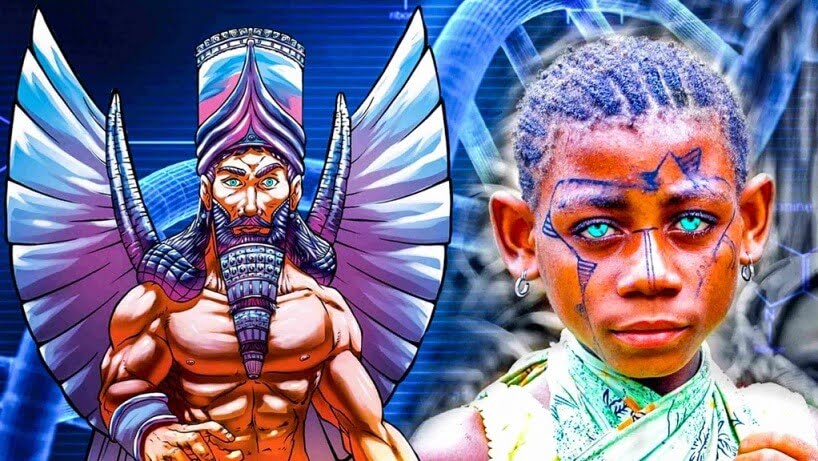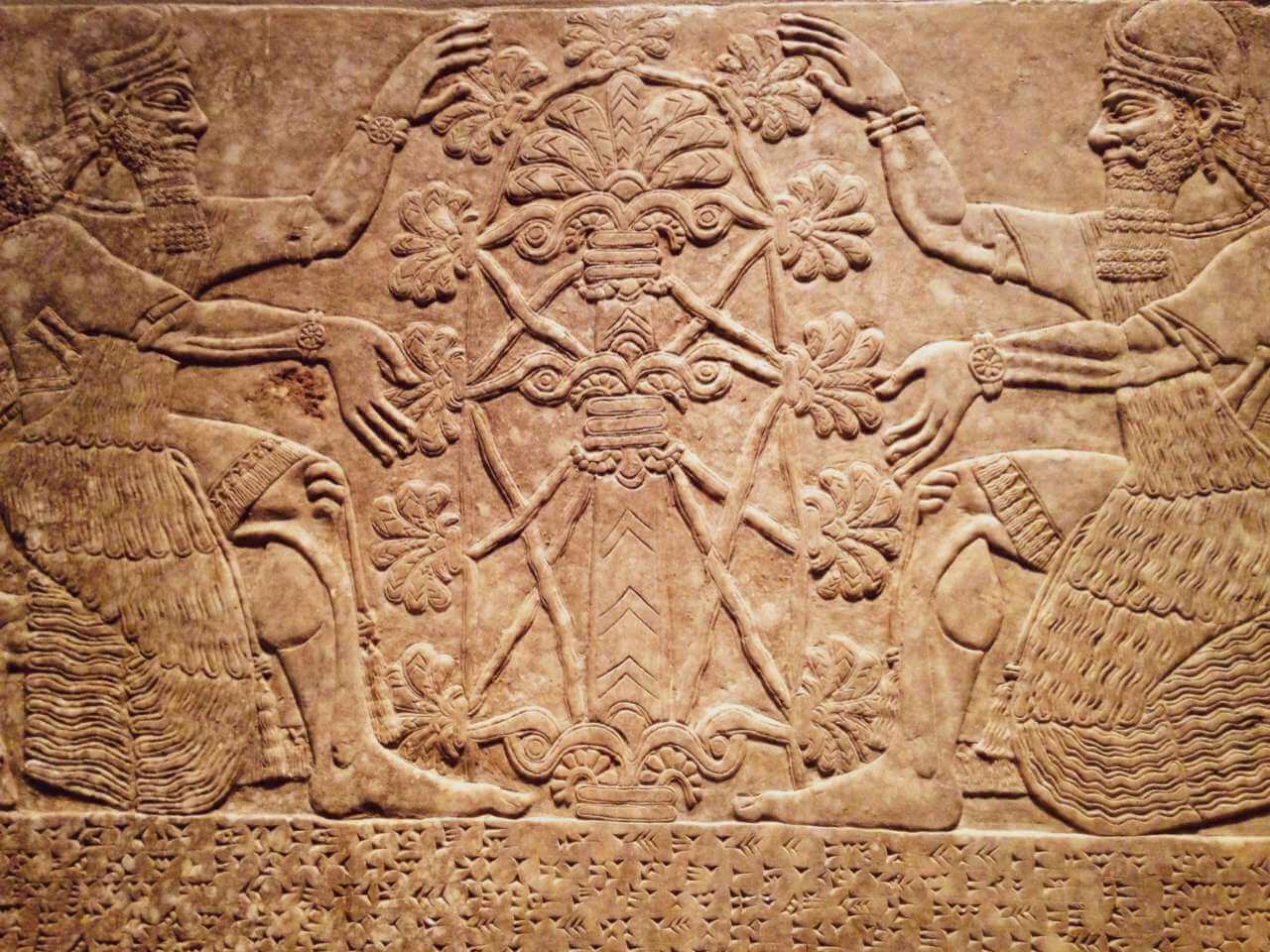The Lost Sons of The Anunnaki: Melanesian Tribe DNA Genes of Unknown Species
In October 2016, the American Society of Human Genetics held its annual meeting, and the conclusions they reached were nothing short of astounding. The data they collected shows that people in Melanesia (an area in the South Pacific that surrounds Papua New Guinea and its neighbouring islands) may be carrying some unknown genes in their DNA. Geneticists believe that unrecognized DNA belongs to a previously unknown species of humanoids.

According to Ryan Bohlender, one of the researchers involved in the study, the species is not Neanderthal or Denisovan, but something different. “We are losing a population, or we are misinterpreting something about relationships,” he said.
Denisovans represent an extinct species belonging to the hominid genus. They were named after the discovery in the cave of Denisova in the Siberian Mountains of Altai, where the first fragment of the bone that belonged to this species was found. Little is known about this enigmatic cousin of ours. While about the people of Melanesia is not known much for the moment. “Human history is much more complicated than we thought,” Bohlender said.

Yes, it is. But piece by piece, the complex past of humanity is brought to light. And discoveries like this seem to point in one direction: we could not be who we think we are. Here’s a quote from the study that you’ll (probably) appreciate:
“With assumptions about population size and the most recent dates of population separation taken from literature, we estimate the date of archaic-modern separation at ~440,000 ±300 years ago for all modern human populations.”
If that number does not ring any bell, reiterate the Anunnaki hypothesis. According to the history of Genesis, the twelfth planet, known as Nibiru, was populated by humanoids very similar to us, means humans. After they encountered a severe problem in the atmosphere, they went on a quest through the solar system to find gold, a unique and significant metal that could heal their planet.
When Nibiru approached Earth’s orbit, approximately 432,000 years before Christ, the Nibiruans used spacecraft to send people and essential goods from their planet to Earth. After reaching the surface, the advanced beings established bases in ancient Mesopotamia.

Many believe that this is the true reason of the creation of humanity – within the laboratories of the Anunnaki geneticists. And this recent study and many more findings confirm this hypothesis almost daily. It offers a vision that could answer one of our oldest and most important questions: Who are we?
To obtain the irrefutable solution to this secular enigma, we must dig deeply where no one has explored before. But this is harder to say than to do. Another way to do this would be to analyse the hidden microscopic records inside each of us. The Anunnaki knew that their DNA was the key to the engineering of the ideal slave. In our endless search for our true lineage, we must do the same as human beings.
In a recent effort, another group of scientists came to a similar conclusion. Led by evolutionary geneticist Eske Willerslev of the Natural History Museum in Denmark, scientists examined DNA samples taken from 83 aboriginal Australians. They also tested 25 participants from native highland populations of Papua New Guinea.
To their surprise, the researchers discovered exotic DNA, similar to Denisovan in the genomes of study volunteers. Keep in mind, the researchers only called it identical to the Denisovan. Still, the group that ceded their genes to the participants’ ancestors is entirely unknown. “Who this group is, we do not know,” Willerslev said. Neither do we, but a particular crowd comes to mind.
Not surprisingly, such discoveries are always made when studying the genome of remote populations. Over the ages, these isolated groups had little contact with the outside world. They lived and procreated within closed communities and this is reflected in their genome. The richer and more diverse your ancestry, the less likely it is that particular genes will remain unchanged. In the case of the Australian and Melanesian aborigines, isolation means that fewer genes were altered throughout their existence.
It is not difficult to imagine this alternative version of our past. The Anunnaki come to Earth, play God, and create humanity. Chief scientist Enki and chief medical officer Ninti use genetic manipulation and in vitro fertilization to create human beings in their image. They use society to serve their purposes, and when it suits them, they dispense destruction in the form of a flood of Biblical Proportions – a part of history suppressed under conspiracy.
Then, some chosen human beings are protected by a faction of the Anunnaki who decided to go against the protocol. They survive and spread in every corner of the globe. Thousands of generations pass, and the genomes of those who “socialize” more mingle beyond recognition. But in some places, the flame of the creators still burns.
* * *
NEXT UP!
Magellan’s Strange Encounter With The 10-Foot Giants of Patagonia
IN 1520, FERDINAND Magellan took time out of his busy schedule of sailing around the world to stop in what is now Patagonia, where he found a naked giant dancing and singing on the shore. Magellan ordered one of his men to make contact (the unwitting emissary’s no doubt hilarious reaction to this sadly has been lost to history), and to be sure to reciprocate the dancing and singing to demonstrate friendship.
It worked. The man was able to lead the giant to a small island offshore, where the great captain waited. Describing the scene was a scholar along for the journey, Antonio Pigafetta, who kept a diary of the journey that was later turned into the book Magellan’s Voyage: A Narrative Account of the First Circumnavigation: “When he was before us, he began to marvel and to be afraid, and he raised one finger upward, believing that we came from heaven. And he was so tall that the tallest of us only came up to his waist,” and had a big, booming voice. The illustration above proves it—Patagonia was once inhabited by giants that positively dwarfed the heavenly Europeans that would come to conquer them.
Alright, maybe that isn’t airtight evidence. But it could well be that the people Magellan encountered, the Tehuelche, were indeed enormous, and that therefore this myth has some grounding in reality. And our trusty explorer would be damned if he wasn’t going to try to bring back evidence in pretty much the most obnoxious way you could imagine.
Related Post
A shocking documentary proves that mermaids do exist
SHOCKING Revelation: Thuya, Mother of Queen Tiye, Was the Grandmother of Akhenaten and Tutankhamun—What Ancient Egyptian Secrets Did She Leave Behind?
Breaking News: Astonishing Discoveries at Karahan Tepe Confirm an Extraterrestrial Civilization is Hiding on Earth, and NO ONE Knows!
Breaking News: Researchers FINALLY Discover U.S. Navy Flight 19 After 75 Years Lost in the Bermuda Triangle!
NASA’s Secret Investigation: Uncovering the Astonishing Mystery of the UFO Crash on the Mountain!
Explosive UFO Docs LEAKED: Startling Proof That Aliens Ruled Ancient Egypt!